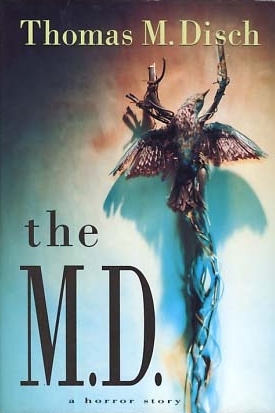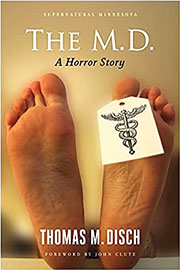 By THOMAS M. DISCH (Alfred A. Knopf; 1991)
By THOMAS M. DISCH (Alfred A. Knopf; 1991)
I recently decided to give this 400-plus page epic another try after my initial read back in 1991. I was a teenager at the time and, as I remember, found the first two thirds absolutely riveting (I was working in a suburban multiplex at the time, and could often be spotted hunched down in theater exit stairwells late at night, compulsively reading this book). Odd, then, that I had such a difficult time finishing the thing. I’ve long assumed the fault was with me and not the book, but rereading it all these years later my reaction was essentially the same: I still find the first part brilliant and the last far less so.
The late Thomas M. Disch (1940-2008) was always been a somewhat problematical author for me. When he was working at full tilt, as in ON WINGS OF SONG (1979), THE BUSINESSMAN (1984) and the first half of THE M.D., there were few authors in or outside the horror/fantasy milieu who could match him. But neither CAMP CONCENTRATION (1968) or 334 (1972), his supposed “masterpieces,” did much for me, and I was unable to get through THE SUB (1999). The man really knows how to write, without question, but that unfortunately does not always guarantee a successful novel.
 Back to THE M.D.: as I said, the book has an absolutely riveting opening, concerning a young boy growing up in the late sixties named William—Billy in this section—who meets Santa Claus one day after a bitchy teacher tells his class SC doesn’t exist. In fact, the “Santa” Billy meets is actually Mercury, the ancient god of medical science, who gives the boy the power to influence reality via a supernaturally endowed caduceus, the emblem of the physician’s art, here represented by two sticks twisted around each other with a dead bird affixed. With his caduceus Billy is able to keep all the trees in his neighborhood ripe and healthy, but also inadvertently causes his grandmother to lose her hair and turns his older brother into a vegetable.
Back to THE M.D.: as I said, the book has an absolutely riveting opening, concerning a young boy growing up in the late sixties named William—Billy in this section—who meets Santa Claus one day after a bitchy teacher tells his class SC doesn’t exist. In fact, the “Santa” Billy meets is actually Mercury, the ancient god of medical science, who gives the boy the power to influence reality via a supernaturally endowed caduceus, the emblem of the physician’s art, here represented by two sticks twisted around each other with a dead bird affixed. With his caduceus Billy is able to keep all the trees in his neighborhood ripe and healthy, but also inadvertently causes his grandmother to lose her hair and turns his older brother into a vegetable.
This is all superbly carried off, so much so that I was tempted to agree with Stephen King’s back cover blurb proclaiming this one of the best horror novels ever. It’s not unlike a King novel, but with an unerring grasp of characterization and headlong narrative drive. While reading it I couldn’t help but wonder if Disch could possibly keep up such a high level of achievement.
Sadly, he can’t.
In the novel’s second act William is a teenager and discovers that in order to use the caduceus for good it must also be used to commit an equal number of evil acts in order to keep it charged. It’s here that William’s future destiny is shaped in a series of gruesome incidents that include an incestuous coupling with his step sister, a hideous mutant birth and a seemingly innocuous encounter with an apathetic store owner.
In the final act, set in the “future” year of 1999, William has grown into a rich and powerful physician by using the caduceus to heal all manner of sickness. To balance things out, however, he’s had to create a disease called ARVIDS, which has devastated the country and led to the formation of detention centers for afflicted people. The product of William’s incestuous union, a demented twerp named Judge, has grown to the age of seventeen and is in thrall to a computerized evangelist who is actually ol’ Mercury in disguise. It seems William’s caduceus is losing its power and Mercury is looking for a replacement subject.
Problematical though it is, the above does round the story out in a fitting manner, with William and his family meeting their collective fates in appropriately gruesome fashion. The prose, alas, is, in direct contrast to that of the rest of the book, quite sluggish in this section. At least one subplot, involving an outraged senator determined to foil William’s plans, is introduced and then suddenly dropped, and the author’s anti-clerical penchant (displayed in his 1995 novel THE PRIEST and his one-act play THE CARDINAL DETOXES, which was apparently “vigorously protested by the Catholic Church”) all-but overwhelms the story in a series of lengthy Biblical quote-studded ruminations that slow the action of the last fifty or so pages to a near halt, just when it needs to be picking up speed.
The result? A good novel that could—and should—have been great. I feel THE M.D. has damn near everything a successful genre novel requires, yet is still lacking one crucial element: a satisfying conclusion.
